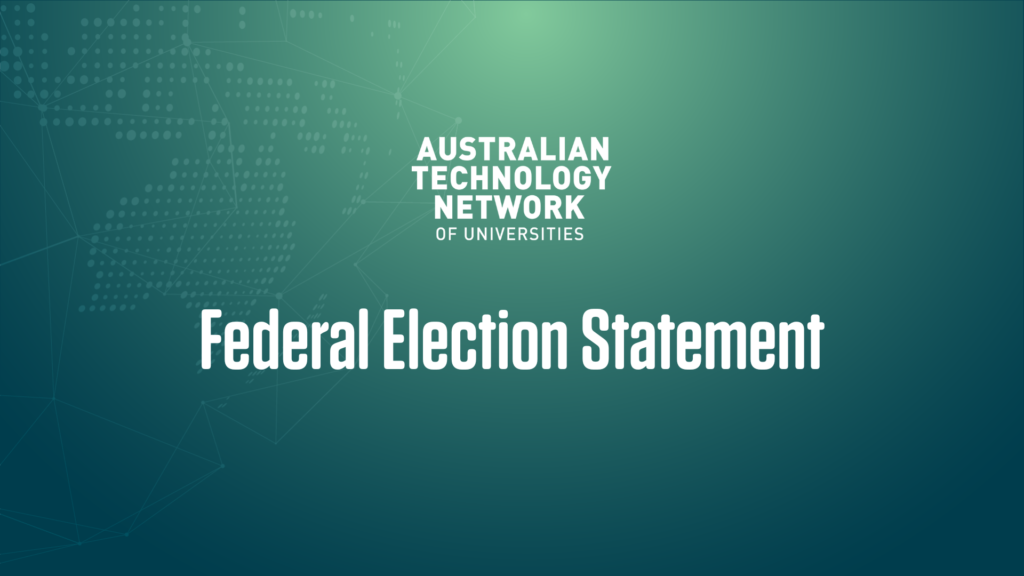UNIVERSITIES ACCORD SHOULD MEET AUSTRALIA’S FUTURE NEEDS AND RESPECT HISTORY OF HIGHER ED
04 September 2023In its response to the Universities Accord Interim Report, the Australian Technology Network of Universities (ATN), said success would be measured by a strong and sustainable, equitable and accountable university system which recognises Australia’s national needs and our unique history.

4 SEPTEMBER 2023
In its response to the Universities Accord Interim Report, the Australian Technology Network of Universities (ATN), said success would be measured by a strong and sustainable, equitable and accountable university system which recognises Australia’s national needs and our unique history.
ATN has provided its response to the Interim Report, outlining five major priorities which should be addressed in the Accord Panel’s Final Report, they are:
- How to develop a coherent national, universal post-secondary education system
- How to achieve equitable access to post-secondary education
- University research and the innovation ecosystem to be developed and supported within an expanded post-secondary education system
- The funding models need to change to produce stable yet responsive sector financing; and,
- Sustain the commitment to, and direction of, sector development.
ATN Executive Director, Luke Sheehy, said moving Australia closer to a universal post-secondary education system was among ATN’s key recommendations submitted to the Accord panel.
“We believe the way forward is through the development of a new national universal post-secondary system. It is crucial that we don’t lose this great opportunity to deliver generational reform. The Accord is providing us with a perfect platform to deliver significant improvements,” Mr Sheehy said.
“By working closely with government and the sector we will shape big, meaningful change. There is more to do but this is our chance – and we must get this right.”
ATN Chair, Professor Harlene Hayne CNZM, added that the Accord Panel and higher education sector should not shy away from the tough decisions.
“We need to embrace bold ideas – the necessary, but difficult and intractable reforms that would otherwise wither on the vine of worthy ideas,” Prof Hayne said.
“The Final Report must outline plans to sustainably meet participation, equity and skills challenges, grow research and teaching at scale, and secure support for our global engagement and social licence.”
ATN believes the Accord should support reforms which need a long-term vision, a united sector and sustained momentum over multiple funding and electoral cycles.
“The five priority actions outlined in the Interim Report provide much needed certainty and stability to the sector while we consider longer-term structural reforms which will be to the benefit of our next generation of students and shape higher education for the next 30 years,” Prof Hayne added.
ATN has led the call for the removal of the 50 per cent pass rule and the extension of the demand driven system to all First Nations people since the release of the Job-ready Graduates proposals in 2020.
On the other three priority actions, ATN recommends that:
- As part of the funding guarantee for 2024 and 2025, the Government clarifies that Commonwealth funding for universities is being increased as proposed under Job‑ready Graduates – with indexation of grants and addition of growth funding
- Efforts to improve university governance will focus on identifying specific problems or weaknesses and seek solutions that align with principles of good institutional governance; and,
- There should be a formal strategy for, and evaluation of, Regional University Centres with better post‑school pathways and cost effectiveness to be sought including utilising existing educational infrastructure like TAFEs.
ATN looks forward to working constructively with all parties to help design and implement further actions from the Accord process.
Media Contact (not for publication)
Frank Coletta (Manager, Media and Communication) m: 0468 987 295 e: frank.coletta@atn.edu.au
The Australian Technology Network of Universities (ATN) was established in 1999 and brings together six of Australia’s leading universities focused on enterprise, impact and finding solutions to issues facing our rapidly changing economy and society. Our member universities are Curtin University, Deakin University, RMIT University, The University of Newcastle, University of South Australia, and University of Technology Sydney. Our universities produce Australia’s most job-ready graduates and undertake world-class research with real-world impact. Through our innovation and leadership, we are proud disruptors challenging the status quo. ATN universities provide world-class education to almost 310,000 students and teach 20 per cent of domestic higher education students, along with 19 per cent of international students and we are the fastest-growing university grouping in terms of domestic students. Together, we are proud of who we include, not exclude, with a strong commitment to equity, excellence, and social justice. ATN is one of Australia’s leading university peak bodies with a track record of advocating and shaping positive policy outcomes with all levels of government.

